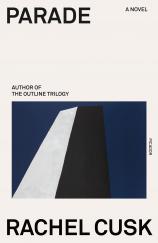Parade
Review
Parade
“Seinfeld” was (supposedly) a show about nothing. However, throughout its long run, it turned out to be the tales of a group of self-obsessed, obnoxious, petty people who made us roar with their responses to the ridiculous minutiae that make up most of our interactions in daily life. Entertainment has long taken the idea of something small and giving it a spotlight as a proper means of illuminating the insanity of modern-day life. Now celebrated author Rachel Cusk once again takes the novel to another stage of definition in her latest effort.
PARADE is a parade of people and voices that may seem hodgepodge to begin with and then becomes a clear indictment of the common ways in which genre stories are told. Cusk explores the next phase of metafiction, changing voice and perspective so often that one may need a little Dramamine to get through the whole affair. But, as promised by the title, each section appears with its own revelatory spirit and surprise guests, music and banality in equal measure. Before this parade passes by, you will want to take a good hard look at what it means.
"In a world that continues to force us to celebrate the old conventional storytelling ways, whether it’s superheroes once again saving the planet from some giant single force or romances that always end up with the duo intact, it is exciting to be part of Rachel Cusk’s orbit."
There is a painter who paints everything, including his wife, upside down. His name is G. A woman is attacked on the streets of Paris. This might be G in another guise. Then the painter G is a young woman of 22, leaving home to escape the disapproval of her stern parents. A mother dies, and her children examine the many ways in which she shaped their vision of her while holding back any love for them. Are these all different people named G? Or are they the same persona in all its various delineations, decorations and celebrations? Who’s to say who runs the parade, who’s in the parade and who’s watching the parade? Cusk has no interest in your answers, so she compiles a dizzying degree of non-specificity that threatens the very boundaries of conventional storytelling.
“She lived obediently in the bare routines of family life. When she met her male peers at parties or openings she saw them as free and herself as enchained. Even if they had families themselves she elaborated her story of their freedom. They were unscheduled, unhurried --- they inhabited one glittering moment after another. She felt as if she was living in simultaneous realities, like the clocks in airports that showed the time in different cities across the world.”
And so grown woman G grapples with a gender gap that reflects how she sees the world --- unfair for women and supportive for men --- because women bear the burden of taking care of the home and family on top of whatever else they wish to contribute and accomplish in society at large. From Cusk’s work with the Outline trilogy and beyond, we see that the world is a matrix in which women must hit as many points as possible, and men generally have just one thing that they must be known for. It is a gap, a mistake, a society fissure so deep that it no longer makes sense. And this is reflected in the varied and unstructured story of G.
Many readers may think that Cusk is being pretentious or showing off here. It appears that her erudite wisdom and way with words are trying to diminish the vagaries of character and plot, moving into something far more malleable that reflects much more directly the multi-tasking, multi-feeling, multi-situational lives that social media and the internet have created for us all. Cusk is trying to find a new language, a perspective that pierces at the very heart of all this new distanced living that we do, celebrating and hating others through the mask of an iPhone. As G finds out, in each incarnation, there is never a sure answer to everything. Cusk ensures that her prose keeps us slipping down the wharf, stopping just before we fall into the water headfirst.
In a world that continues to force us to celebrate the old conventional storytelling ways, whether it’s superheroes once again saving the planet from some giant single force or romances that always end up with the duo intact, it's exciting to be part of Rachel Cusk’s orbit. We celebrate the fact that none of us are sure what it is that we're celebrating, as the undercarriage of social convention rusts out and artists try hard to explain what's going on.
PARADE is another link in Cusk’s path to the future of the novel in general.
Reviewed by Jana Siciliano on June 21, 2024
Parade
- Publication Date: June 17, 2025
- Genres: Fiction
- Paperback: 208 pages
- Publisher: Picador
- ISBN-10: 1250390494
- ISBN-13: 9781250390493




